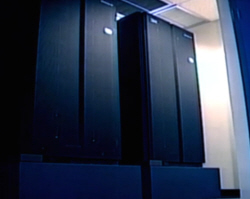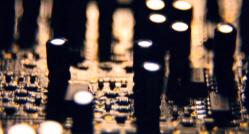Garry Kasparov v Deep Blue
But history didn’t stop. Other people were trying to reshape more than merely human and they included scientists working in the beating heart of capitalism; New York.
In 1997, a game of chess began.
Chess Challenge
The defender, the reigning world chess champion, Garry Kasparov. The challenger, a supercomputer built by IBM, it had a name. Deep Blue.

Newscaster “The world of chess is bracing itself for what they’re calling the match of the century.”
The match between man and machine was dubbed “The brain’s last stand”.
Chess has always been seen as one of the ultimate tests of human memory and concentration and planning and intuition. There are said to be more possible moves in a game of chess than there are atoms in the universe.
Human chess players deal with this extraordinary complexity by seeing patterns, using their imagination and their intuition. Computers can only grind the numbers. They have no intuition. Or so people thought.

Kasparov opened the first game with the classic attack. An IBM expert was carrying out the moves dictated by the computer. A chess genius like Kasparov could calculate three moves a second. But in that same second, his electronic opponent could process 200 million possible moves.
The world champion played an aggressive first game. After four hours, he’d gained the upper hand. If this was the brain’s last stand, the brain seemed to be doing pretty well. Deep Blue conceded defeat.
Newscaster “And Garry Kasparov has won the first game against the Deep Blue in fantastic style.”
The second game was the turning point in the match between man and machine. Kasparov tried to lure Deep Blue into a trap. But the computer didn’t take the bait. It went quiet. It processed its options, for a full 15 minutes. Then it ignored the trap and made a brilliant strategic move of its own. This was the decisive moment. It almost seemed as if the computers had been thinking.
The great master was being outsmarted by a circuit board. Kasparov tried to escape but every manoeuvre was futile. There was no way out. The machine had beaten the man.

Newscaster “And Kasparov has resigned.” The Chess challenge was over, the human was defeated.
Kasparov said later, “Deep Blue sees so deeply, it plays like God.”
The idea of machines waking up and becoming cleverer than we are is something that has long haunted science-fiction and Hollywood, but it is cold belief of many scientists that this will happen and in the lifetime of many of the people watching this.
If so, it would be the greatest achievement of humanity since the invention of agriculture, but it would be one which challenged the very idea of what it is to be human.
